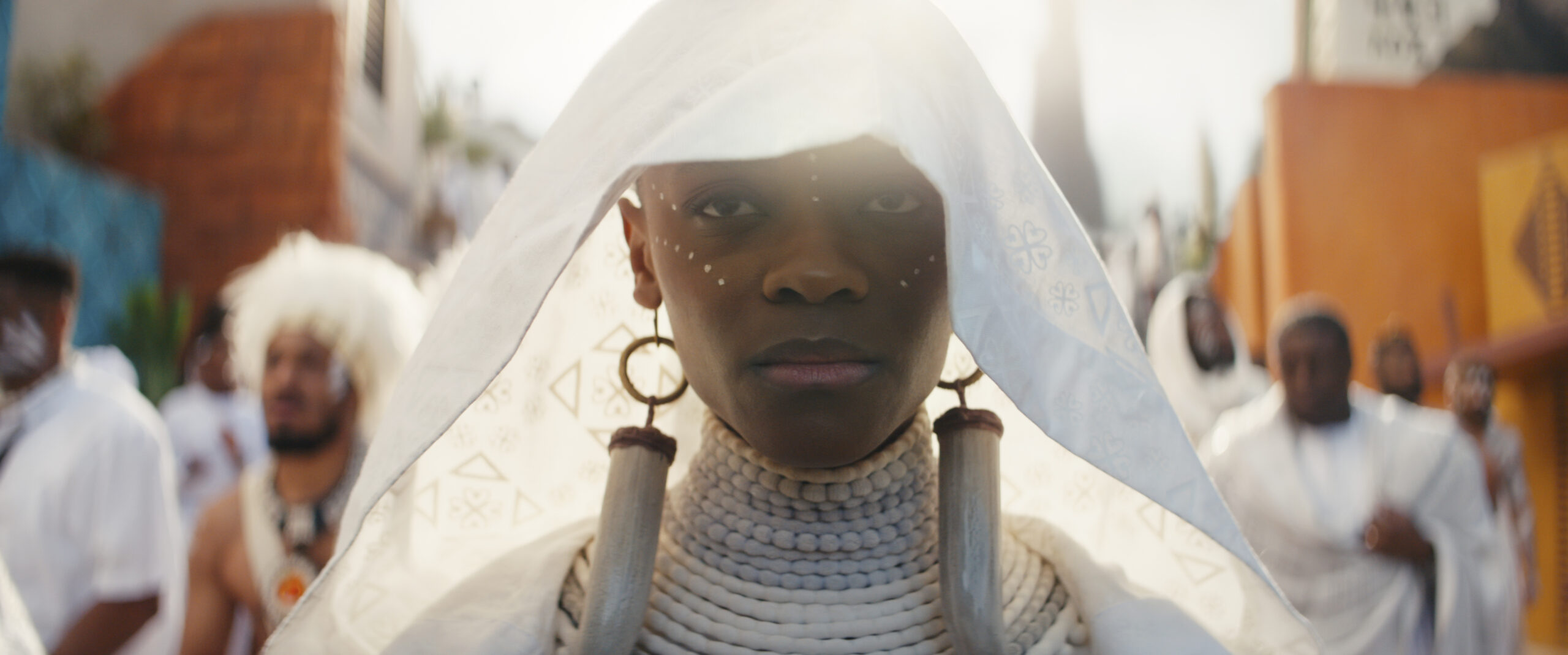
When Black Panther: Wakanda Forever isn’t being a Marvel movie, it’s a lot of fun. I’m not saying this because I have a bias against Marvel. I’m saying this because the ties-into-the-expanded-Marvel-universe stuff in Wakada Forever connects to the main narrative about as well as a Duplo locks onto a Lego.
What does work is everything that happens in Wakanda and in the domain of the film’s adversary, Namor and the Talokans. When the movie is focused on those two kingdoms, it becomes a terrific fantasy story about powerful versions of two cultures that have historically been subjugated by colonizers. The Talokans are a Mesoamerican culture inspired by Aztec mythology. Thanks to their own interaction with the substance that gave Wakanda its technological and mystical power, they rival the Wakandans.
Princess Shuri’s negotiations with Talokan king Namor are charged with the buzz of mutual discovery that is typical of YA fantasy stories. If this wasn’t Marvel, there would be a proper romance included. Since the MCU is framed primarily for young men, that romantic subplot is repressed, but the tingle remains. Wakanda Forever is already a long film. If it didn’t have to constantly bounce back to the MCU stuff, maybe there would have been more time to develop that relationship and what it means to Shuri, how it challenges her dogged agnosticism, tempts her to a less charitable form of leadership, and complicates her unwillingness to grieve the loss of her father and brother.
As everyone knows, this film was originally supposed to star Chadwick Boseman reprising his role as T’Challa. When he died suddenly and tragically of colon cancer, Ryan Coogler and his team had to dramatically adjust their plans for the film. To its credit, Wakanda Forever handles Boseman’s death elegantly. It is integrated into the story, but it also presented in a way that honors the importance of Boseman’s T’Challa as a symbol beyond even the expanse of the MCU.
It’s the only bit of MCU-ness that really works in the film. The rest is actually just the MacGuffin – the thing in a story people are chasing but which isn’t what the story is about at all, and which causes everyone, characters and audience included, to miss the point if they focus on it instead of the story’s emotional core. Wakanda Forever is as if The Wizard of Oz tried to convince you that what matters most in the story isn’t Dorothy or her companions, but rather her shoes.
Ryan Coogler is an excellent filmmaker. He hasn’t yet made a film that isn’t worth your time. I’m happy to see his next projects aren’t franchise films though. I’m eager to see what he’ll do without any obligation to serve a product line. Wakanda Forever is far from a bad film. Sift out the MCU stuff, and it’s close to great. Who would go see it though if it wasn’t connected to this larger franchise though? Stand-alone fantasy films don’t fare too well these days. I suspect people don’t really like the kinds of stories Marvel movies are. I think they like being current. It’s not about the movies. It’s about the moment. Eighty-three years from now will anyone be able to reference a Marvel movie to explain how stories work? Will they ever become part of our cinematic lingua franca the way The Wizard of Oz is? I doubt it. Time will tell.
When Black Panther: Wakanda Forever isn’t being a Marvel movie, it’s a lot of fun. I’m not saying this because I have a bias against Marvel. I’m saying this because the ties-into-the-expanded-Marvel-universe stuff in Wakada Forever connects to the main narrative about as well as a Duplo locks onto a Lego.
What does work is everything that happens in Wakanda and in the domain of the film’s adversary, Namor and the Talokans. When the movie is focused on those two kingdoms, it becomes a terrific fantasy story about powerful versions of two cultures that have historically been subjugated by colonizers. The Talokans are a Mesoamerican culture inspired by Aztec mythology. Thanks to their own interaction with the substance that gave Wakanda its technological and mystical power, they rival the Wakandans.
Princess Shuri’s negotiations with Talokan king Namor are charged with the buzz of mutual discovery that is typical of YA fantasy stories. If this wasn’t Marvel, there would be a proper romance included. Since the MCU is framed primarily for young men, that romantic subplot is repressed, but the tingle remains. Wakanda Forever is already a long film. If it didn’t have to constantly bounce back to the MCU stuff, maybe there would have been more time to develop that relationship and what it means to Shuri, how it challenges her dogged agnosticism, tempts her to a less charitable form of leadership, and complicates her unwillingness to grieve the loss of her father and brother.
As everyone knows, this film was originally supposed to star Chadwick Boseman reprising his role as T’Challa. When he died suddenly and tragically of colon cancer, Ryan Coogler and his team had to dramatically adjust their plans for the film. To its credit, Wakanda Forever handles Boseman’s death elegantly. It is integrated into the story, but it also presented in a way that honors the importance of Boseman’s T’Challa as a symbol beyond even the expanse of the MCU.
It’s the only bit of MCU-ness that really works in the film. The rest is actually just the MacGuffin – the thing in a story people are chasing but which isn’t what the story is about at all, and which causes everyone, characters and audience included, to miss the point if they focus on it instead of the story’s emotional core. Wakanda Forever is as if The Wizard of Oz tried to convince you that what matters most in the story isn’t Dorothy or her companions, but rather her shoes.
Ryan Coogler is an excellent filmmaker. He hasn’t yet made a film that isn’t worth your time. I’m happy to see his next projects aren’t franchise films though. I’m eager to see what he’ll do without any obligation to serve a product line. Wakanda Forever is far from a bad film. Sift out the MCU stuff, and it’s close to great. Who would go see it though if it wasn’t connected to this larger franchise though? Stand-alone fantasy films don’t fare too well these days. I suspect people don’t really like the kinds of stories Marvel movies are. I think they like being current. It’s not about the movies. It’s about the moment. Eighty-three years from now will anyone be able to reference a Marvel movie to explain how stories work? Will they ever become part of our cinematic lingua franca the way The Wizard of Oz is? I doubt it. Time will tell.

Elijah Davidson is Co-Director of Brehm Film and Senior Film Critic. Subscribe to Come & See, his weekly newsletter that guides you through the greatest films ever made, and find more of his work at elijahdavidson.com.
This is not Disney’s film. It is a much darker, weirder tale, rough with knots and splinters, but glowing with boyish mischief.